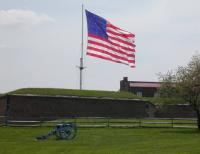
The Star Spangled Banner over Fort McHenry
Here is a lightly modified repost from two years ago that seems appropriate for July 4th.
At around 6AM, Sep 13, 1814, the British Royal Navy began a fearsome bombardment of Fort McHenry at the mouth of Baltimore harbor. The British had attempted to take Baltimore by both land and sea. The British army attack stalled the day before, with the loss of Major General Robert Ross. As the British Army prepared a second attack on the American earthworks, the Royal Navy took its turn. Baltimore’s defenders had sunk 22 ships in the main channel. Any attempt to clear the channel would bring the British under the the guns of Fort McHenry and other American batteries.
After initial skirmishing, the Royal Navy anchored just out range of Fort McHenry’s guns and brought to bear the most advanced weaponry of their day. Five bomb ships; HMS Terror, HMS Volcano, HMS Meteor, HMS Devastation, and HMS Aetna; could each fire cast iron exploding shells weighing upwards of 200 pounds for a distance of two miles. HMS Erebus, a ship carrying Congreve rockets with a range almost as great as the mortars, fired their novel, if not very accurate rockets at the fort, as well. (The bomb ship, HMS Terror, would later serve in the ill-fated Franklin expedition. The Franklin expedition used two modified bomb ships, chosen for Arctic exploring for their robust construction. One of Franklin’s two ships HMS Erebus has been discovered. While she shares the same name as the Congreve rocket ship in the Battle of Fort McHenry she was built in 1826.)
The bombardment lasted 27 hours, through a raging September storm that added rain, thunder and lighting to the cacophony. The bomb ships fired between 1,500 to 1,800 exploding shells at the fort. HMS Erebus fired thousands of rockets. The bombardment ended when the ships began to run out of ammunition.
Between the storm and the darkness of the night, it was difficult to judge the effectiveness of the bombardment. Just after dawn, the Americans at Fort McHenry took down a smaller storm flag and raised a massive 30 ft × 42 ft American flag on the fort’s flagpole, making it entirely clear that the fort had not surrendered. Despite the intensity of the bombardment, only four were killed and 24 wounded in Fort McHenry during the attack.
An American attorney and part-time poet, Francis Scott Key, who was on an American truce-ship in the harbor, watched the bombardment through the long and stormy night. When he saw the banner raised, he was inspired to write a poem. Initially titled “Defense of Fort M’Henry,” it was later sung to the tune of a British drinking song, To Anacreon in Heaven, and became known as the “Star Spangeld Banner.” The song was popular with troops in the American Civil war and during World War I. It was made the national anthem of the United States by an act of Congress in 1931.
The anthem describes what Key saw and couldn’t see during the nighttime bombardment, illuminated only by “the rockets’ red glare, the bombs bursting in air”:
O say can you see by the dawn’s early light,
What so proudly we hailed at the twilight’s last gleaming,
Whose broad stripes and bright stars through the perilous fight,
O’er the ramparts we watched, were so gallantly streaming?
And the rockets’ red glare, the bombs bursting in air,
Gave proof through the night that our flag was still there;
O say does that star-spangled banner yet wave,
O’er the land of the free and the home of the brave?
As both the British Army and Navy had failed to dislodge the American defenders, they reloaded their troops on their ships and sailed away. The British attempts to redraw the map in final days of the War of 1812 were failing miserably. The British thrust south from Canada had ended in their naval defeat in Plattsburgh Bay, three days before the failed attack on Fort McHenry. The British would make one more attempt, striking north from New Orleans, in December, where they would also be roundly defeated.
